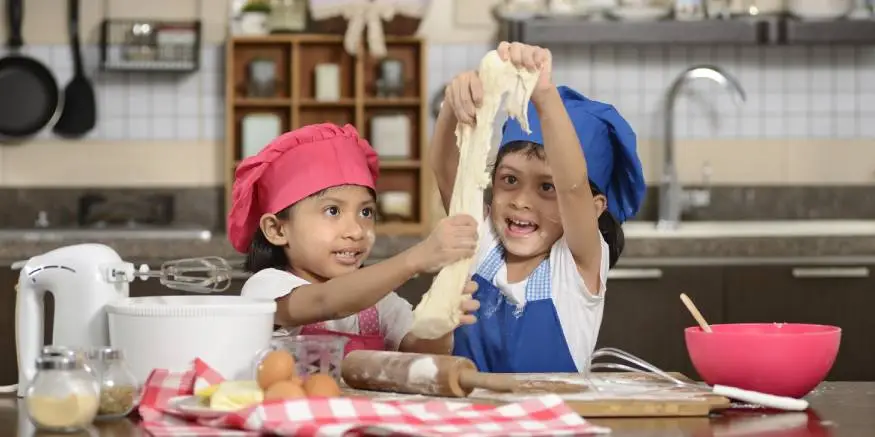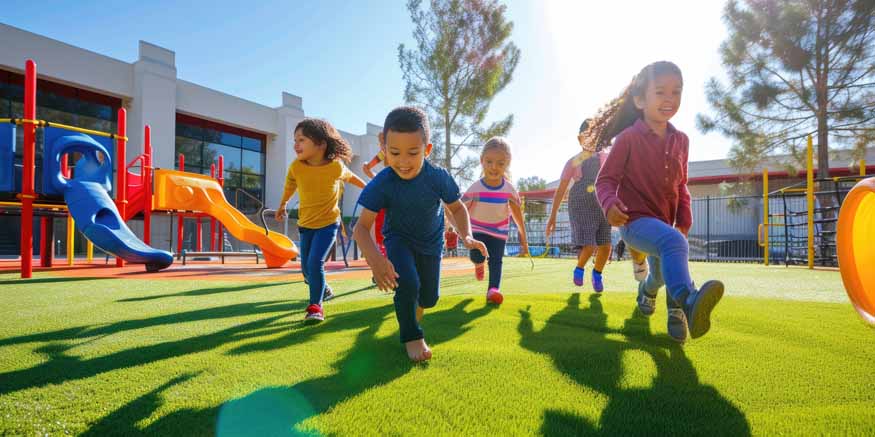Learning to cook is like becoming a wizard in the kitchen! It helps you do things on your own, make cool recipes, and eat yummy food that’s good for you. If you’re a kid who wants to learn to cook, this guide is for you! It’s full of fun stuff to help you become a cooking master with your grown-up helpers. So, let’s put on our aprons and get ready to cook up some magic in the kitchen!
- Start with Safety
- Age-Appropriate Tasks
- Incorporate Learning
- Make It Fun
- Encourage Creativity
- Teach Nutritional Values
- Plan and Shop Together
- Introduce Cultural Cuisine
- Use Technology Wisely
- Emphasize Cleanliness
- Celebrate Their Efforts
- Set Realistic Expectations
- Encourage Teamwork
- Create a Routine
Cooking is super fun, but safety is really important too! Before you let your child help out in the kitchen, make sure they know some basic safety stuff. Talk to them about hot stoves, sharp knives, and other kitchen stuff that can be tricky. It’s like teaching them the rules of a new game so they can play safely and have a blast cooking with you!
Key Safety Tips:
– Always wash hands before handling food.
– Use oven mitts when dealing with hot items.
– Teach knife safety, including proper handling and cutting techniques.
– Keep a first-aid kit handy in case of minor injuries.
By instilling these safety habits early, you create a secure environment where your child can confidently learn to cook.
Tailor cooking tasks to your child’s age and skill level. Younger children can start with simple activities that build their confidence, while older kids can take on more complex tasks.
For Toddlers (2-4 years):
– Washing fruits and vegetables.
– Stirring ingredients in a bowl.
– Tearing lettuce for salads.
For School-Age Children (5-7 years):
– Measuring ingredients.
– Using cookie cutters.
– Mixing batter.
For Tweens (8-12 years):
– Chopping soft fruits and vegetables with a kid-safe knife.
– Following simple recipes.
– Using the microwave with supervision.
For Teens (13+ years):
– Cooking on the stovetop.
– Baking in the oven.
– Planning and preparing complete meals.
Adapting tasks to their abilities helps children feel accomplished and motivated to learn more.
Cooking is super cool because you can learn lots of fun stuff while making yummy food! You can count how many ingredients you need, like counting chocolate chips or pasta noodles. And when you mix things together, it’s like a science experiment! You can see how ingredients change when you heat them up or mix them.
Math Skills:
– Measuring ingredients helps with understanding fractions and volumes.
– Counting items needed for a recipe.
Science Concepts:
– Discuss the chemical reactions that occur during cooking, such as how baking soda makes dough rise.
– Explore how heat changes the properties of food.
Reading Skills:
– Following a recipe enhances reading comprehension.
– Identifying and reading labels on ingredients.
By integrating these learning opportunities, you make cooking a multidimensional educational experience.
Also Read: Cooking Games For Kids
Cooking should be an enjoyable activity. Infuse fun into the process to keep your child engaged and interested.
Fun Ideas:
– Create themed cooking days, such as Italian night or taco Tuesday.
– Let your child decorate cupcakes or cookies with their favorite toppings.
– Turn cooking into a game, such as a mini cooking competition.
Music and Atmosphere:
– Play upbeat music to create a lively kitchen environment.
– Encourage singing or dancing while cooking.
When kids associate cooking with fun, they are more likely to develop a lasting interest in it.
Cooking is an art, and the kitchen is a canvas. Encourage your child to experiment and be creative with their culinary creations.
Ways to Foster Creativity:
– Allow them to choose recipes or invent their own.
– Encourage them to mix and match ingredients to create new flavors.
– Use cooking as an outlet for artistic expression, such as decorating dishes beautifully.
Creativity in the kitchen boosts confidence and develops problem-solving skills.
Learning about food is super important for picking yummy and healthy stuff to eat! You can show your child how different foods are like superheroes that give them energy and make them strong. Eating a little bit of everything, like fruits, veggies, and grains, is like having a team of superheroes in their tummy! It helps them grow big and strong, just like their favorite superheroes.
Nutritional Education:
– Explain the food groups and the benefits of each.
– Discuss the importance of vitamins, minerals, and proteins.
– Encourage them to try a variety of fruits and vegetables.
By teaching nutritional values, you empower your child to make informed dietary choices.
Involving your child in meal planning and grocery shopping gives them a sense of ownership and responsibility.
Planning Tips:
– Let them choose recipes they are excited about.
– Make a shopping list together.
– Discuss the importance of budgeting and making healthy choices.
Shopping Tips:
– Teach them how to read food labels.
– Explain the difference between fresh, frozen, and canned foods.
– Show them how to select fresh produce.
Also Read: Montessori Kitchen Tools For Cooking
Introducing your child to different cuisines broadens their palate and cultural awareness.
Cultural Exploration:
– Cook dishes from various countries and discuss their cultural significance.
– Use cooking as a way to explore family heritage and traditions.
– Teach them about global ingredients and cooking techniques.
Exploring cultural cuisine promotes open-mindedness and curiosity.
Technology can be a valuable tool in teaching kids to cook. Utilize online resources to enhance their learning experience.
Online Resources:
– Find kid-friendly cooking videos and tutorials.
– Use apps and websites that offer interactive cooking classes.
– Explore digital cookbooks and recipe sites.
Benefits of Technology:
– Provides visual and step-by-step instructions.
– Offers a variety of recipes and cooking techniques.
– Makes learning to cook online accessible and fun.
Good hygiene is essential in the kitchen. Teach your child the importance of cleanliness before, during, and after cooking.
Cleanliness Tips:
– Always start with clean hands and a tidy workspace.
– Clean as you go to avoid a cluttered kitchen.
– Teach them to wash utensils and surfaces after use.
Emphasizing cleanliness ensures a healthy cooking environment and teaches responsible habits.
Celebrating your child’s culinary achievements, no matter how small, boosts their confidence and enthusiasm.
Ways to Celebrate:
– Share their creations with family and friends.
– Take photos of their dishes and create a cooking scrapbook.
– Give them a special apron or chef’s hat as a reward.
Positive Reinforcement:
– Compliment their cooking skills and effort.
– Encourage them to continue experimenting and learning.
It’s important to set realistic expectations for both you and your child. Understand that mistakes and mishaps are part of the learning process.
Expectation Tips:
– Start with simple recipes and gradually increase difficulty.
– Be prepared for imperfect results and use them as learning opportunities.
– Focus on the process rather than perfection.
Setting realistic expectations ensures a stress-free and enjoyable cooking experience.
Also Read: Kitchen Safety
Cooking together fosters teamwork and collaboration. Involve all family members in the cooking process to create a sense of unity.
Teamwork Activities:
– Assign different tasks to each family member based on their skills.
– Work together to prepare a meal from start to finish.
– Encourage communication and cooperation.
Benefits of Teamwork:
– Strengthens family bonds.
– Teaches the importance of working together towards a common goal.
Establishing a regular cooking routine helps reinforce skills and makes cooking a natural part of your child’s life.
Routine Tips:
– Set aside specific days or times for cooking together.
– Incorporate cooking into your weekly meal planning.
– Encourage your child to take on more responsibility as they become more confident.
Cooking classes can significantly enhance your child’s culinary skills and passion for cooking.
Visit EuroSchool to learn more about our programs and how we can help your child reach their full potential.









